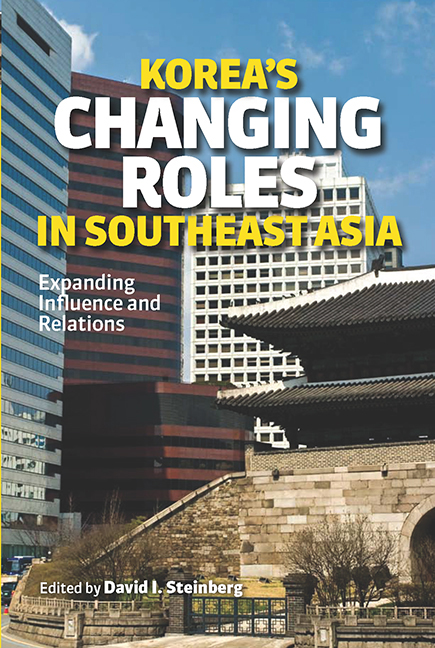Book contents
- Frontmatter
- Contents
- List of Tables, Figures and Photos
- Foreword
- Message
- Acknowledgements
- The Contributors
- 1 Tenuous Beginnings, Vigorous Developments
- 2 Perspectives on Korea's Role in ASEAN
- 3 South Korea and Southeast Asia: Ideas for Deepening the Partnership
- 4 Divergence Amidst Convergence: Assessing Southeast and Northeast Asian Security Dynamics
- 5 Korea's Economic Relations with Southeast Asia
- 6 Investment of Korean Electronics Industry in Southeast Asia
- 7 Korean Assistance to Southeast Asia
- 8 Korean Development Model: Lessons for Southeast Asia
- 9 Southeast Asian Migrant Workers in South Korea
- 10 Filipina Wives and “Multicultural” Families in Korea
- 11 A Fading Wave, Sinking Tide? A Southeast Asian Perspective on the Korean Wave
- 12 The Korean Wave: Korea's Soft Power in Southeast Asia
- 13 The Republic of Korea in Southeast Asia: Expanding Influences and Relations
- 14 Korea's Preparation for Southeast Asia: Research and Education on Southeast Asian Studies in Korea
- 15 Conclusion
- Index
5 - Korea's Economic Relations with Southeast Asia
Published online by Cambridge University Press: 21 October 2015
- Frontmatter
- Contents
- List of Tables, Figures and Photos
- Foreword
- Message
- Acknowledgements
- The Contributors
- 1 Tenuous Beginnings, Vigorous Developments
- 2 Perspectives on Korea's Role in ASEAN
- 3 South Korea and Southeast Asia: Ideas for Deepening the Partnership
- 4 Divergence Amidst Convergence: Assessing Southeast and Northeast Asian Security Dynamics
- 5 Korea's Economic Relations with Southeast Asia
- 6 Investment of Korean Electronics Industry in Southeast Asia
- 7 Korean Assistance to Southeast Asia
- 8 Korean Development Model: Lessons for Southeast Asia
- 9 Southeast Asian Migrant Workers in South Korea
- 10 Filipina Wives and “Multicultural” Families in Korea
- 11 A Fading Wave, Sinking Tide? A Southeast Asian Perspective on the Korean Wave
- 12 The Korean Wave: Korea's Soft Power in Southeast Asia
- 13 The Republic of Korea in Southeast Asia: Expanding Influences and Relations
- 14 Korea's Preparation for Southeast Asia: Research and Education on Southeast Asian Studies in Korea
- 15 Conclusion
- Index
Summary
Background
Korea's economic relationship with ASEAN for both trade and investment dates far back. Indeed, when Korea's economy began expanding vigorously in the past, especially before the normalization of its relationship with China in 1992, Southeast Asia — mainly ASEAN — was the main area among the developing regions of the world where Korea's trade and particularly its outward foreign direct investment were carried out. Then China began to replace ASEAN, to some extent, in Korea's trade and investment markets from 1992 onwards. However, it was after the outbreak of the Asian (and Korean) financial crisis in 1997 that China really began to replace ASEAN as Korea's main economic partner. Both Korea and ASEAN were too badly hurt by the crisis to continue their existing economic relationship; the economic recessions shrank market demand and the shortage of foreign exchange limited investment potential for both Korea and ASEAN shortly after the crisis.
Since 2000, the economic relationship between Korea and ASEAN has begun turning back to the pre-crisis level as both economies have emerged from the doldrums of the crisis. The history of the trade and investment relationship between Korea and ASEAN in the past, turbulent fifteen years or so will first be described in this chapter. This will be followed by an investigation of other related issues such as Korea's construction activities in the area, FTA negotiations with ASEAN, and labour migration from ASEAN to Korea. Then, the role of Korea in ASEAN in view of the presence of other very important East Asian players in this region, namely Japan and China, will be discussed. Finally, prospects for a future economic relationship between the two will be explored.
Korea's Economic Relationship with ASEAN
Korea's Trade Relationship with ASEAN
Annual trend and country distribution
The annual trend of trade in terms of exports, imports, trade volumes, and trade balances between Korea and ASEAN from 1990 to 2006 is shown in Table 5.1. From the table, the following can be summarized with respect to the trade relationship between ASEAN and Korea: (1) The total trade volume of Korea with ASEAN during this period increased 5.5 times during 1990–2006. However, the share of ASEAN in total Korean trade volume fluctuated around a 10 per cent level — reaching 11.5 per cent in 2000 but since declining to less than 10 per cent in more recent years.
- Type
- Chapter
- Information
- Korea's Changing Roles in Southeast AsiaExpanding Influence and Relations, pp. 80 - 117Publisher: ISEAS–Yusof Ishak InstitutePrint publication year: 2010

